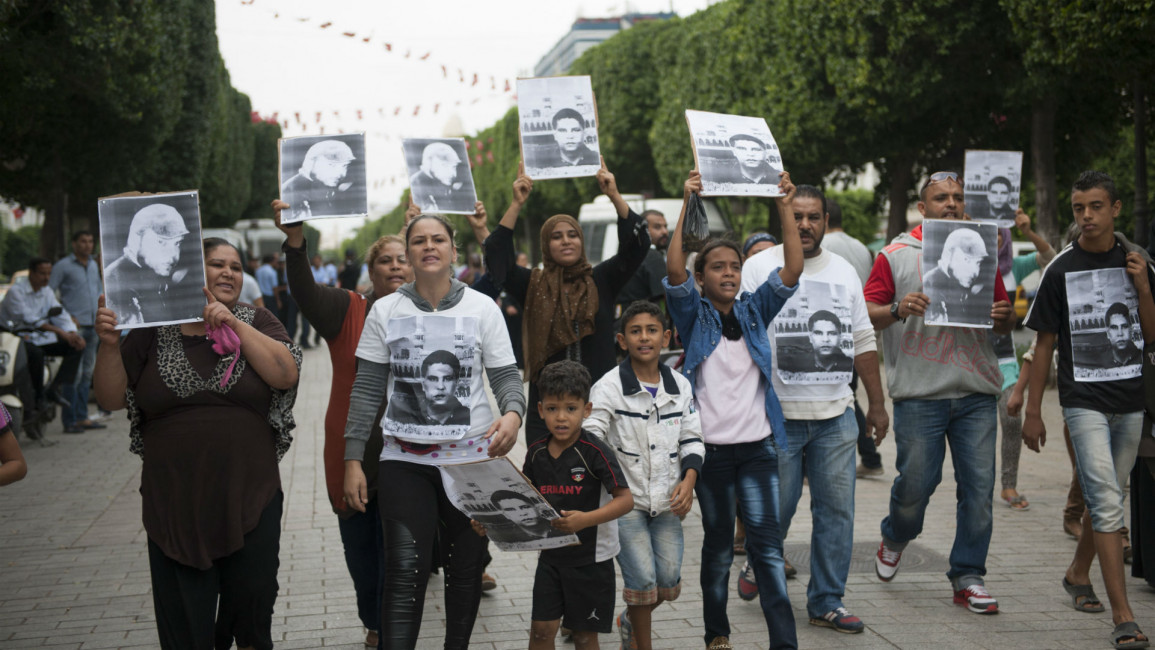
Tunisia: when will the state apologise?
In most countries that have become democracies, the new state attempts - as far as possible - to develop a reconciliation process between ruler and ruled, by acknowledging the violations against citizens by the state's security and administrative apparatus in previous eras.
Not in Tunisia, however. The state has not considered opening the files on Habib Bourguiba or even the deposed Zine el-Abidine Ben Ali, whose repressive regimes left thousands of Tunisians in jails, graves and exile.
Some people had their professional, academic and social lives brought to a standstill and were left without a family, a homeland, a spouse or a home. Others were denied work, success and travel, forced into limbo.
Many people have suffered marginalisation and systematic oppression by the dictator and his cronies, with thousands denied an income, a passport, the opportunity to visit their families, for nothing more than expressing an opinion which displeased the "master of masters" or the "protector of religion" and his aides.
Thus, the dictator and his supporters subjected peaceful people to heinous punishment and locked them up in dungeons and stripped them of their rights.
Political prisoners were fifth-tier citizens, shunned and ostracised like they had come from another planet. If they were released from their cell in the rulers' prison it was only to enter the larger prison cell of a society living in fear of a police state, a society that found satisfaction in other people's misery, to the extent to which struggling for your rights became an accusation and a sentence of doom.
The crime of saying 'no'
Political prisoners had their voices confiscated and were shackled just because they said "no" to the tyrant state, "no" to the theft of the people's wealth, "no" to the curbing of freedom of thought and organisation, "no" to being stripped of their identity. Few people even noticed, let alone supported them as they suffered in silence.
They were the best of Tunisia's children. They came from different parts of Tunisian society, some ideological, some religious.
They had different visions and methodologies, but they agreed on a single goal: to liberate Tunisia from the oppressor and his gang, which meant that they shared the same punishment, just as they shared a love of their country.
While the big-bellied, sharp-suited men in their comfortable chairs busied themselves with silence or applause for the dictator and his cronies, political prisoners screamed in their cells in the prisons at Borj Erroumi, Nadhor, el-Haouareb, Harboub, to name but a few.
After being strip-searched they would walk barefoot to their crowded cells, crammed together with no water, sunlight or fresh air. They would sleep hungry and the whips of the torturers did not part from their skin for long.
| While the big-bellied, sharp-suited men in their comfortable chairs busied themselves with applause for the dictator and his cronies, political prisoners screamed in their cells |
All the while, they would dream of meeting a dying mother or a grieving father. Despite that, they dreamed of a tomorrow in which the sun of freedom would rise and justice would be served against the oppressors, and the suffering of the prisoners would be recognised.
The revolution came and hope grew but, alas, political prisoners remain the last priority for the transitional government in Tunis.
All the while, statues are erected for a deceased despot and mourning sessions are held for another who was deposed and escaped.
And now opportunists who have jumped on the bandwagon of the revolution are attempting to sidestep the suffering of political prisoners and deny them the chance to resume their lives and mend the wounds inflicted upon them.
To those opportunists I say: stop trying to upstage political prisoners, because you have not experienced prison in your lives, your lives have not stopped, you were never denied the light of day, you never slept hungry, you have never been tortured.
Germany apologised for its crimes under Nazi rule and South Africa apologised to the victims of apartheid. Even Morocco apologised to the political prisoners of previous eras. Now the Tunisian state should apologise to the victims of tyranny and restore their rights and help them to heal and overcome the pain of history.
Without this, the process of national reconciliation and transitional justice will remain incomplete.
This is an edited translation of the original Arabic.




